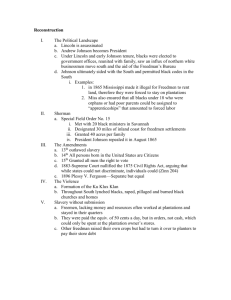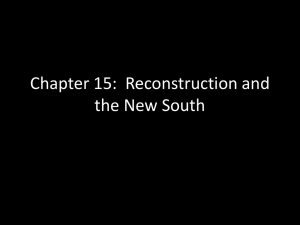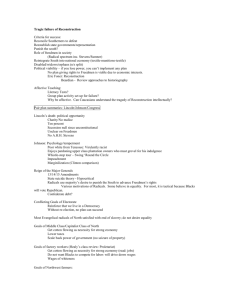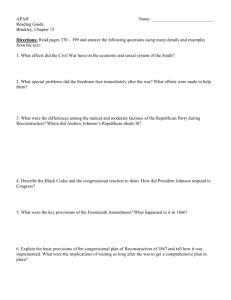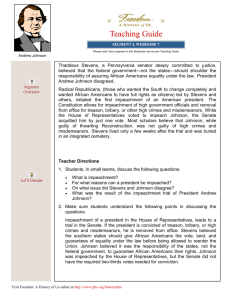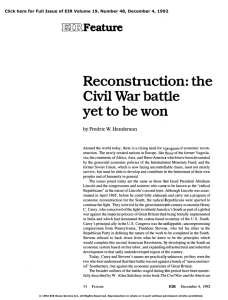Failure of Reconstruction
advertisement
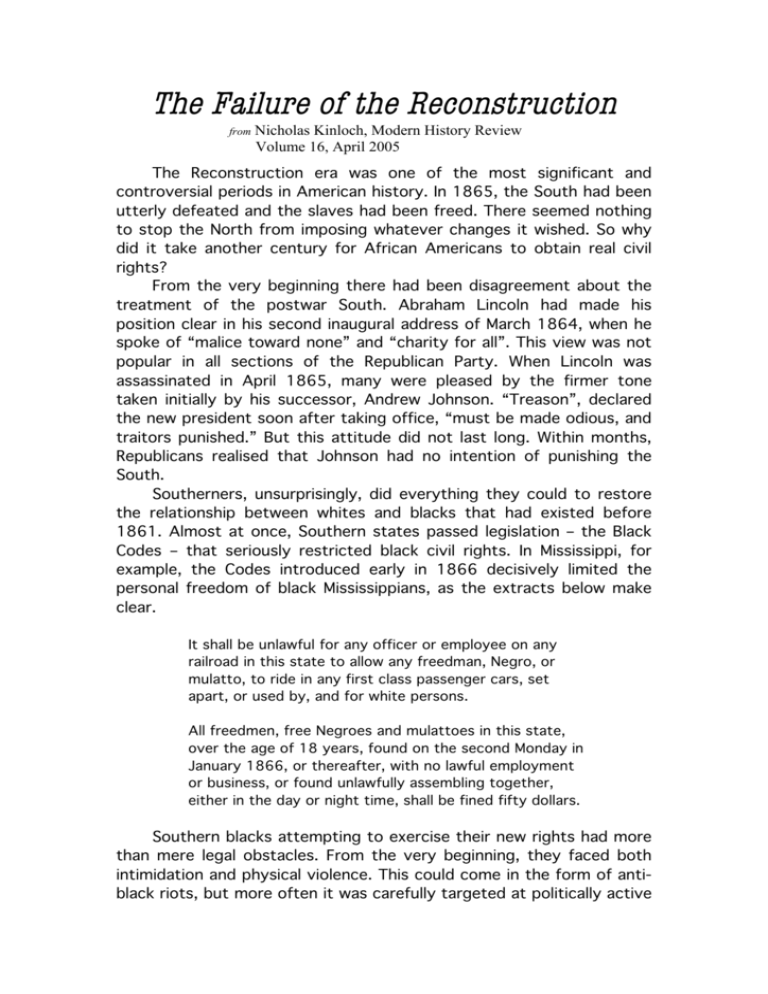
The Failure of the Reconstruction from Nicholas Kinloch, Modern History Review Volume 16, April 2005 The Reconstruction era was one of the most significant and controversial periods in American history. In 1865, the South had been utterly defeated and the slaves had been freed. There seemed nothing to stop the North from imposing whatever changes it wished. So why did it take another century for African Americans to obtain real civil rights? From the very beginning there had been disagreement about the treatment of the postwar South. Abraham Lincoln had made his position clear in his second inaugural address of March 1864, when he spoke of “malice toward none” and “charity for all”. This view was not popular in all sections of the Republican Party. When Lincoln was assassinated in April 1865, many were pleased by the firmer tone taken initially by his successor, Andrew Johnson. “Treason”, declared the new president soon after taking office, “must be made odious, and traitors punished.” But this attitude did not last long. Within months, Republicans realised that Johnson had no intention of punishing the South. Southerners, unsurprisingly, did everything they could to restore the relationship between whites and blacks that had existed before 1861. Almost at once, Southern states passed legislation – the Black Codes – that seriously restricted black civil rights. In Mississippi, for example, the Codes introduced early in 1866 decisively limited the personal freedom of black Mississippians, as the extracts below make clear. It shall be unlawful for any officer or employee on any railroad in this state to allow any freedman, Negro, or mulatto, to ride in any first class passenger cars, set apart, or used by, and for white persons. All freedmen, free Negroes and mulattoes in this state, over the age of 18 years, found on the second Monday in January 1866, or thereafter, with no lawful employment or business, or found unlawfully assembling together, either in the day or night time, shall be fined fifty dollars. Southern blacks attempting to exercise their new rights had more than mere legal obstacles. From the very beginning, they faced both intimidation and physical violence. This could come in the form of antiblack riots, but more often it was carefully targeted at politically active blacks and their white sympathisers by terrorist organisations such as the Ku Klux Klan or the Knights of the White Camellia. To some Northerners, it was unacceptable that there should be such a rapid attempt to undo the liberation of the black population. They expected the new president to take immediate action. Instead, Johnson was determined to maintain white supremacy in the South. In 1866, he attempted to veto the Supplementary Freedmen’s Bureau Act, which would have extended the powers of the Freedmen’s Bureau. More important, he attempted to veto the Civil Rights Act, which sought to place all citizens on an equal footing. Although the act was passed over Johnson’s veto, it was clear that it would never be enforced without a Constitutional amendment. The Fourteenth Amendment declared that no state could limit the rights of citizens without legal authority and that, if a state denied voting rights to male citizens, its representation in Congress would be reduced. The subsequent congressional elections were largely fought on this issue. Republicans won a landslide, allowing Congress to take the initiative in Reconstruction for the first time. No former rebel state could now be admitted to the Union without first ratifying the 14th Amendment. This was achieved through a number of Reconstruction Acts, all of which Johnson attempted to veto. Why had Johnson rejected all efforts to improve the status of African Americans? In fact his background made it very unlikely that he would do anything for them. He was a Southerner, from Tennessee. Although he had been firmly committed to the Union at the outbreak of war, he had been a slave-owner. He regarded African Americans as essentially inferior. In 1865, he assured Southerners that, “White men alone must manage the South.” In his 1867 annual message to Congress, Johnson stated that, “Blacks possess less capacity for government than any other race of people” and denied that any form of independent government had ever been successful in their hands. As well as holding these racist attitudes, which were common to both South and North, Johnson was committed to states’ rights. He did not believe that the federal government had the right to impose any policies, especially concerning suffrage, on the Southern states. Johnson, like Lincoln, also believed that Reconstruction was a matter for the executive branch of the government to decide, rather than Congress. These policies, both on civil rights and on presidential power, were a direct challenge to the growing power of a small group within the Republican Party, known as the Radicals. Increasingly, they dominated Congress after the election of the 39th Congress, which met in December 1865. The most prominent were Thaddeus Stevens of Pennsylvania, George W. Julian of Indiana, Charles Sumner and Benjamin Wade, both from Massachusetts. The Radicals grew increasingly unhappy as Johnson’s policies diverged from their own. As early as July 1865, Stevens had complained that Southern rebels had not been punished. They had instead, he complained, “been sent on tl1eir way rejoicing”. Stevens and Sumner in particular were committed to black civil rights as a matter of simple justice. Entitlement to civil rights, however, might not necessarily mean having the vote. It was quite possible to argue, as many did, that freedmen should enjoy equal protection with whites under the law, without being granted suffrage. This was certainly the view of more moderate Republicans. But the Radicals, in Johnson’s phrase, were “wild for Negro suffrage.” In January 1867 Thaddeus Stevens asked, “Have not loyal blacks quite as good a right to choose rulers and make laws as rebel whites?” Radicals realised that, unless blacks had some say in choosing who governed them, they would inevitably be ruled by their former masters. Of course there would also be a political advantage to black suffrage. Radicals assumed that most former slaves would be likely to support the Republican Party. And enabling black people to enter the political process would help to achieve the other main Radical goal: the destruction of the former plantation aristocracy of the South. Radicals believed that it was this class which had organised both secession and civil war. In the end, however, the Radicals were unsuccessful. There were a number of reasons for this. One was that the planter aristocracy proved to be far more resilient than they had assumed. Figures for Alabama, which reflect the South as a whole, suggest that a relatively small number of planters had been totally ruined by the war. But the majority, while not so well off as they had been in 1860, were still much better off than they had been 10 years earlier. The Radicals were not really able to challenge segregation or other forms of discrimination in the South. The passing of the 15th Amendment in 1870, designed to compel both Northern and Southern states to guarantee black voting rights, was undermined because it did not outlaw the widespread practice of demanding voting qualifications. Nor did the Amendment guarantee blacks the right to hold office. The death of Thaddeus Stevens in 1868 removed the most powerful single voice in favour of civil rights. It was clear from the presidential election of 1868 that there was little public appetite for providing any further help for civil rights. On the contrary, many Northerners were horrified when Hiram Revels was elected to Senate, showing that black “domination” of the South was a real possibility. The passing of a further Civil Rights Act in 1875 was ineffective; political control in the South had now passed decisively towards the white majority. This position was to remain essentially unaltered until the renewed civil rights movement began in the 1950s.
